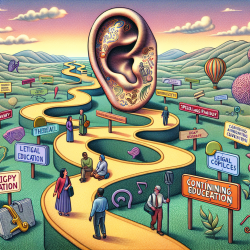The fields of Speech-Language Pathology (SLP) and Audiology in Indiana are governed by a complex set of laws, regulations, and ethical standards that professionals must navigate to maintain licensure and provide the highest quality of care. This guide aims to elucidate these requirements, focusing on licensure, continuing education, the role of aides, and the importance of adhering to professional and ethical standards.
Licensure Requirements for SLPs and Audiologists
Indiana requires SLPs and Audiologists to be licensed by the Indiana Speech-Language Pathology and Audiology Board. The process involves completing an accredited master's program, gaining supervised clinical experience, passing a national examination, and submitting an application with the required fee. Notably, professionals seeking licensure in both fields must apply separately for each.
Continuing Education (CE)
To ensure that SLPs and Audiologists stay current with the latest practices and research, Indiana mandates 36 hours of continuing education (CE) for license renewal every two years. Acceptable CE activities include attending educational programs, university courses relevant to the field, and engaging in self-study, though no more than 6 hours can be obtained through self-study. It's crucial for professionals to document their CE activities, as they may be audited by the Board.
The Role and Regulation of Aides
Indiana recognizes two levels of SLP aides - SLP aide I and SLP aide II, each with specific educational requirements and scopes of practice. Aides must work under the direct supervision of a licensed SLP, and their tasks are limited to non-diagnostic and non-interpretative functions. Importantly, SLPs are responsible for the actions of their aides and must ensure they do not perform tasks outside their scope, such as interpreting test results or providing counseling.
Professional and Ethical Standards
SLPs and Audiologists in Indiana are expected to adhere to high professional and ethical standards. This includes ensuring patient welfare, maintaining confidentiality, avoiding conflicts of interest, and not engaging in fraudulent practices. Violations can result in disciplinary actions, including license suspension or revocation.
Legal Compliance and Best Practices
Professionals must stay informed about changes in laws and regulations affecting their practice. This includes understanding the legal definitions and scope of practice for SLPs, Audiologists, and their aides, as well as the requirements for CE and licensure renewal. Practitioners are also encouraged to engage in ethical practices that prioritize patient care and maintain the integrity of the profession.
In conclusion, navigating the regulatory landscape of Speech-Language Pathology and Audiology in Indiana requires a commitment to continuous learning, ethical practice, and legal compliance. By adhering to these standards, professionals not only ensure their ability to practice but also contribute to the overall quality and effectiveness of care provided to those with speech, language, and hearing needs.
For more information, please follow this link.










